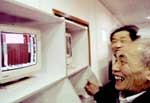 |
Great Expectation for Resumed B-share

Great Expectation for Resumed B-share
Despite few deals reported on the Chinese B-share market, resumed Wednesday, experts still hold an optimistic view about the B-shares' future, citing the day's B-share indices, that closed at 91.42 points and 140.09 points respectively in Shanghai and Shenzhen.
In expectation of higher prices, most of the brokers were reluctant to sell their stocks at an early stage, experts analyzed.
Since China opened its B-share market to mainlanders a week ago, a vast number of people have opened accounts at the Shanghai and Shenzhen stock exchanges.
For instance, the number of newly opened B-share accounts in the past two days nationwide is eightfold that of the previous eight years' total, with the number of B-share accounts in Shanghai almost hitting 200,000.
Currently, much is being done to improve the trading capacities of the Chinese B-share market.
According to staff members of the Shanghai Stock Exchange, the current maximum number of daily deals stands at five million, which is expected to reach 14 million when the trading system is upgraded.
The opening of the B-share market reflects the fact that the regulatory departments are resolved to rejuvenate the B-share market, and finally make the B- and A-shares naturally incorporated, noted Xie Rongxing, a senior executive at the Shanghai-based Guotai-Junan Securities Co., Ltd.
With a total of 114 listed companies and a limited financing capacity of 4.63 billion US dollars, the Chinese B-share market has long been bleak, thus deeply injuring the investors' confidence, and has caused many overseas investors to withdraw their money.
Although they had a tremendous amount of foreign currency in hand, many Chinese mainlanders had long been denied access to the B-share market.
According to statistics, the total deposits in foreign currency of Chinese mainlanders approached 75 billion US dollars by the end of January this year, representing tenfold the amount now being circulated in the B-share market.
The total deposits, if invested in B-shares, could dramatically revive the market, which has suffered long-term sluggishness due to a series of negative factors ranging from limited market scale to unbalanced capital structure, experts say.
In 2000, another 72,100 accounts were opened in the Chinese B-share market, whose annual turnover doubled that of 1999.
The opening of the B-share market will work as a prelude to the opening of A-shares to overseas investors, and in a larger sense signifies that China will speed up the opening of its capital market to foreign investment, some unnamed overseas investors commented.
"The opening of B-shares to mainlanders will also benefit overseas investors in the long term," said Pan Yingli, a finance professor at East China Teachers' University, adding that overseas investors who have traded in the B-share market will probably buy more.

In This Section

|